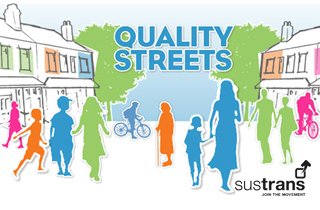My role
- About Us
Slower streets are healthier
Slower streets are quality streets and better for public health say Sustrans. A new campaign by the charity for smarter travel choices is calling on people to to demand that their local authority take action to produce residential areas where people feel safe to walk, cycle and socialise - so called 'Quality Steets'.
 Sustrans say a key element of this is a 20 mph speed limit and is asking people to lobby their local councillor between now and the end of February for slower speeds.
Sustrans say a key element of this is a 20 mph speed limit and is asking people to lobby their local councillor between now and the end of February for slower speeds.Backing the campaign, MHF CEO Peter Baker said: 'Reduced speed limits are good for physical health in terms of reduced emissions and reduced risk of accidents and good for mental health in that they make it possible for neighbours to talk and children to play. At a time when all the talk is of spending cuts, this is a public health reform that costs next to nothing. We hope as many people as possible will heed Sustrans call and contact their council over dangerously high residential speed limits. We hope as many councils as possible will listen.'
Alex Allen, Sustrans’ expert in street redesign says: 'When we surveyed 2,000 individuals last year, 85% of them said they faced problems from speeding traffic or nuisance parking. People feel powerless to deal with the problem: 90% of those people we spoke to didn’t know how to make improvements to their street, yet 70% were willing to get involved in making changes.'
Fast traffic prevents wellbeing
'People think of traffic as something that affects the physical environment - taking up space, causing noise and pollution - but its effect on our social lives may be even more profound. At its worst, traffic prevents community interaction and wellbeing. It is a part of modern life but it doesn’t have to dominate our lives and we want local authorities to make the first move towards more quality streets by lowering speed limits to 20mph in urban and residential areas.'
Over the last three years Sustrans has worked hand-in-hand with local communities to improve their streets with inexpensive, cost effective re-designs aimed at minimizing speeding traffic, rat-running, anti-social behaviour. Simple ideas such as slowing down traffic using brighter reflective road surfacing, using greenery to act as natural chicanes and tidying up rubbish bins to clear pavements have all been done with minimum cost but big benefits.
In the streets where such changes have happened residents now feel much safer, with their fear of traffic greatly reduced. Half of residents agree that traffic speeds have been reduced and 36% now say they’d be happy to let their children play outdoors (compared with just 9% before the changes were made).
- What do you think about lower speed limits? Let us know.
- Visit www.quality-streets.org.uk before the end of February, 2011 to lobby your local councillor.
Page created on October 27th, 2010
Page updated on October 29th, 2010
Comments
In This Section
Haringey health humour
I'd rather admit I love John Ryan!


 Donate to the MHF
Donate to the MHF
 Man MOT
Man MOT